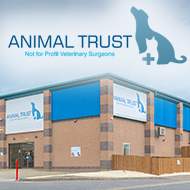Animal Trust receives community interest status

Animal Trust provides free face-to-face consultations for sick and injured animals.
Not-for-profit group Animal Trust has become the first veterinary company in the UK to receive community interest status (CIC).
Animal Trust, which has nine surgeries across the UK, maintains its not-for-profit ethos by providing free face-to-face consultations for sick and injured animals, 'no matter who they are, or where they come from'.
Animal Trust founder, Owen Monie, said: “The CIC status is an important milestone for us, as it locks our commitment in law where our priority always is the health and care of the animals we see in each of our communities."
A CIC is a type of limited company which exists to benefit the community rather than private shareholders. Once established, the public benefit is protected in law and the social benefit can never be lost.
Owen continued: “I originally set up Animal Trust to provide a not-for-profit service to focus on improving the welfare of animals, and to help their owners as many struggle to afford private practices.
“Since we first opened, the demand for our services has only continued to grow, proving how important it is for pets to be able to access good veterinary care, and that pet ownership should not just be accessible for the wealthy.”
Animal Trust first opened in Bolton in 2012 and has since established surgeries in West Midlands, North Wales, Cheshire, Merseyside, Greater Manchester, Lancashire, and Yorkshire.
The group provides an array of veterinary facilities including general practice care, dentistry, complex surgery, orthopaedics, CT scanning, imaging, hydrotherapy, physiotherapy, 24/7 in-patient and emergency care, and on-site laboratories.



 The latest
The latest